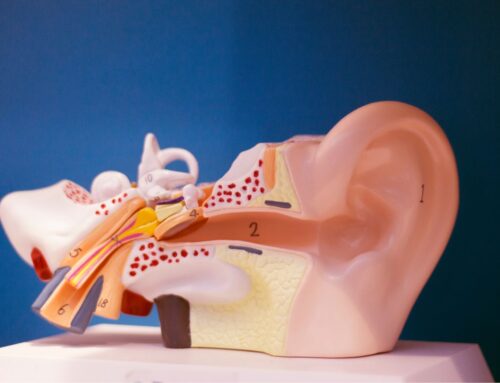Correlations Between Stress, Meniere’s Disease, and Vertigo
Understanding how stress and anxiety can contribute to vertigo can help you effectively manage and alleviate your symptoms.
What is vertigo?
Vertigo is a symptom and not an underlying condition itself. It is the sensation of the room spinning and experiencing dizziness. Vertigo is caused by issues with the vestibular system – the sensory system for balance. The vestibular system consists of the vestibular labyrinth which consists of semicircular canals, otolithic organs, and the cochlea. These components and the sensory cells in the labyrinth work together to send the brain information about movement and spatial orientation. This keeps us stabilized, and supports posture, and spatula awareness as we move through space.
The vestibular system can experience issues that produce vertigo as a symptom. Common causes include inner ear disorders like Meniere’s disease, viral infections that lead to vestibular neuritis or labyrinthitis, cholesteatoma, and benign paroxysmal positional vertigo (BPPV). One of the most prominent symptoms of vertigo is dizziness which can be short-lived or longer bouts. Additional symptoms include:
- Nausea, vomiting
- Headaches or migraines
- Lightheadedness, feeling faint
- Loss of balance
- Sweating
- Tinnitus: a ringing or buzzing-like noise in the ears
- Feeling pressure or fullness in the ears
These symptoms can come and go or be longer lasting. The way people experience vertigo varies. It is important to also know that stress can worsen vertigo symptoms.
What is the link between stress and vertigo?
Research has shown a link between stress and vertigo. Studies suggest that stress and anxiety can trigger or worsen vertigo and related symptoms. This includes a study conducted by researchers in Japan which investigated this link by evaluating vasopressin, a stress hormone, level in patients with Meniere’s disease – an inner ear disorder that causes vertigo. This study included 297 people who were separated into different groups and received therapeutic interventions and were evaluated for two years. Researchers found that with therapeutic interventions like abundant water intake, quality sleep, and tympanic ventilation tubes; vasopressin concentrations largely decreased as did vertigo symptoms.
Additionally, stress-related hormones like cortisol and adrenaline can also impact the vestibular system. These hormones can increase heart and respiratory rate as well as contribute to dizziness sensation as well as interfere with the messages being sent from the vestibular system to the brain about movement and position.
How is vertigo treated?
Treatment for vertigo largely depends on the underlying cause that is producing it. A few treatment options include:
- Medications: this includes antibiotics to clear viral or bacterial infections causing vertigo. Other medications can be prescribed to alleviate symptoms like dizziness and nausea caused by inner ear disorders.
- Vestibular Rehabilitation Therapy (VRT): this type of specialized therapy involves practicing specific exercises that focus on gaze stabilization, balance training, and habituation which includes repeating movements without triggering vertigo.
- Canalith Repositioning: this treatment is specifically used to treat BPPV. It involves a specialist facilitating certain head movements to help move the calcium deposits that become dislodged.
In addition to these treatment options, there are several strategies you can practice at home to alleviate vertigo, this includes managing stress effectively.
What are additional tips to manage vertigo?
Making lifestyle changes and simple adjustments in everyday life is a useful way to help alleviate tinnitus. A few tips include:
- Exercise: increasingly physical exercise can be as simple as taking a daily walk. This is a great way to process stress and keep yourself active at the same time.
- Meditation: practicing deep breathing techniques, yoga, and meditation are all great ways to manage and move through stress effectively. This prevents stress from taking a toll on your health and triggering vertigo.
- Practicing good sleep habits: sleep is essential. Getting quality rest supports the body’s systems and boosts overall wellness. Practice good sleep habits by creating a routine, investing in optimal bedding, and using sleep aids if needed (earbuds, black-out curtains, aromatherapy, etc).
These tips can reduce stress levels and the hormones associated with stress that can also worsen vertigo. If you experience vertigo or any of these symptoms that sound familiar to you, contact us to schedule an appointment to be evaluated. Some solutions can transform your health and wellness. Call us today to learn more.







Leave A Comment